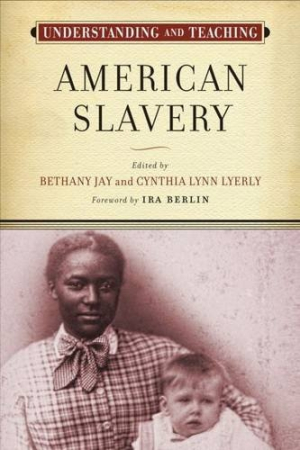Understanding and Teaching American Slavery
This is a concise academic methodology for explaining the insidious institution of slavery and its continuing ramifications for American culture.
Understanding and Teaching American Slavery purports to do what any thinking person in this country might consider an impossible task: provide an academic scheme for explaining the insidious institution of slavery in this country and its continuing ramifications within American culture. The book’s editors—Bethany Jay, associate professor of history at Salem State University, and Cynthia Lynn Lyerly, associate professor of history at Boston College—have done just that.
This slim volume contains a compelling introduction by the editors, and an even more powerful argument from Ira Berlin on the need to teach the history of slavery. Berlin, Distinguished Professor of History at the University of Maryland, identifies ten “essential elements” that he believes should be incorporated into every curriculum on the subject: “appreciating these ten elements in the history of slavery opens the door to a conversation that may transform not only our students but also the society in which they live.”
This is a primary purpose of this book: recognizing and comprehending the pervasiveness of slavery in the history of this country, its continuing influence on the culture and institutions of this country, and, by opening discussions on these delicate issues, fundamentally changing American society.
Nonacademic readers will find provocative facts on nearly every page, information that will enlighten everyone and stir even the most timid soul to a deeper reflection on the issue of race. The legacy of slavery that continues to marginalize people of color, to keep them “in their place,” is explicated in abundantly clear terms.
The book is divided into three parts, each part dealing with a different aspect of teaching slavery while never straying from the guiding principal stated by Jay and Lyerly: “This book is our effort to … grapple with the ugly truths of America’s past.” Their effort is comprehensive and honest. Each essayist contributes innovative insights into slavery and the concept of history, using stimulating techniques, such as slave narratives, film, and art. Each chapter reinforces the idea that there is nothing in American culture not affected by slavery.
Every teacher should read this book and be reinvigorated in his or her task of presenting history accurately and thoroughly. Every citizen should read this book and be rededicated to the ideals of this society–equality and fairness.
Reviewed by
John Senger
Disclosure: This article is not an endorsement, but a review. The publisher of this book provided free copies of the book to have their book reviewed by a professional reviewer. No fee was paid by the publisher for this review. Foreword Reviews only recommends books that we love. Foreword Magazine, Inc. is disclosing this in accordance with the Federal Trade Commission’s 16 CFR, Part 255.

